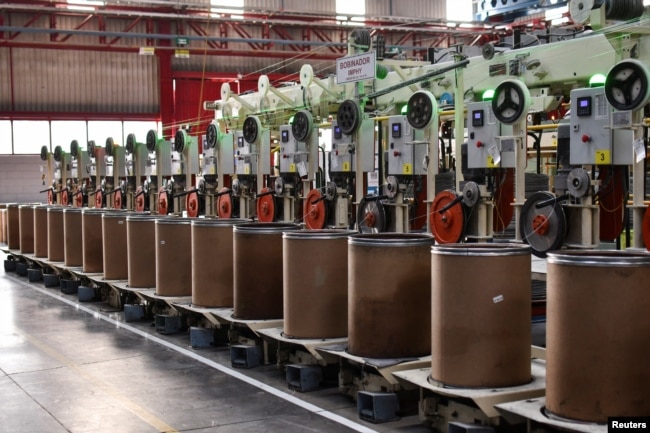U.S. President Donald Trump is planning to impose new tariffs Tuesday on Canadian and Mexican exports to the United States, but Commerce Secretary Howard Lutnick said Sunday they may not be as high as the 25% figure Trump was planning.
“That is a fluid situation,” Lutnick told the Fox News show “Sunday Morning Futures.”
“There are going to be tariffs on Tuesday on Mexico and Canada. Exactly what they are, we’re going to leave that for the president and his team to negotiate,” he said.
Lutnick’s comments were the first indication that the Trump administration may not impose the full 25% tariffs he announced last week on all goods from Mexico and non-energy imports from Canada, contending that the two U.S. neighbors are still not doing enough to curb the flow of illicit drugs into the United States.
Lutnick said Mexico and Canada have “done a reasonable job” securing their borders with the United States, although the deadly drug fentanyl continues to flow into the country.
Trump first announced the tariffs a month ago but then delayed their effective date after Mexican President Claudia Sheinbaum announced she would send 10,000 troops to Mexico’s northern border with the U.S. to curb the flow of narcotics, and Canadian Prime Minister Justin Trudeau said he would name a “fentanyl czar” to deal with the issue.
Trump is also adding another 10% tariff on Chinese goods Tuesday, doubling 10% duties he imposed on Feb. 4. Trump has blamed China as the source of fentanyl trafficking into the U.S.
In announcing the new tariffs last week, Trump said, “Drugs are still pouring into our Country from Mexico and Canada at very high and unacceptable levels. A large percentage of these Drugs, much of them in the form of Fentanyl, are made in, and supplied by, China.” He made the comments on his Truth Social platform.
Sheinbaum, whose trade-dependent economy sends 80% of its exports to the U.S., said last week Mexico was “expecting to reach a deal with the United States” before the new levy took effect but that if not, could impose retaliatory tariffs on U.S. products exported to Mexico.

When Trump first announced the hefty U.S. tariff on Canadian imports in early February, Trudeau said it was “entirely unjustified” and promised to impose a 25% tax starting March 12 on U.S. steel and aluminum products exported to Canada. Canada is the top exporter of both metals to the U.S.
Economists say that the tariffs Trump is imposing are likely to boost retail prices for consumers and the cost of materials for businesses. Mexico, Canada and China, in that order, are the three biggest national trading partners with the U.S., although collectively, the 27-nation European Union is larger than all three individually.
Trump, at his first Cabinet meeting of his new presidential term last week, said he would “very soon” announce a 25% tariff on EU exports to the U.S.
He contended that the EU was “formed [in 1993] to screw the United States” economically.
With Trump signaling the new tariff on goods sent to the U.S., the EU vowed to respond “firmly and immediately” to “unjustified” trade barriers and suggested it would impose its own tariffs on U.S. imports if Trump proceeded with his.
Trump said reciprocal tariffs on nations that levy taxes on U.S. exports are still set to take effect on April 2. He has also hinted at putting tariffs on automobile imports, lumber, pharmaceutical products and other goods.
Also See: China Rejects Trump’s Tariff Threat, Says Fentanyl Crisis Is U.S. Problem
Many economists have repeatedly warned that tariffs could lead to higher prices, boosting troublesome inflation in the U.S. Trump has acknowledged there could be short-term pain for Americans but has contended that tariffs would ultimately be beneficial to the U.S. economy, the world’s largest.
Trump says the tariffs he is imposing would be an incentive for foreign companies to do more manufacturing in the United States to avoid the tariffs on overseas shipment of their products to the U.S.
More immediately, Trump has focused on the flow of drugs into the U.S.
“More than 100,000 people died last year due to the distribution of these dangerous and highly addictive POISONS,” he said in his social media post.
“Millions of people have died over the last two decades,” Trump declared. “The families of the victims are devastated and, in many instances, virtually destroyed. We cannot allow this scourge to continue to harm the USA, and therefore, until it stops, or is seriously limited, the proposed TARIFFS scheduled to go into effect on MARCH FOURTH will, indeed, go into effect, as scheduled.”
This news is sourced from VoA and is intended for informational purposes only.

![Lutnick says U.S. tariffs on Mexico, Canada may be lower than 25%; trade partners warn of retaliation amid economic concerns. [Image via AFP]](https://southasiatimes.org/wp-content/uploads/2025/03/4ec004b3-5fe6-41c2-90c4-5dbc6a3fb0cb_w1023_r1_s.webp)
![Ukrainian and Russian flags with soldier silhouettes representing ongoing conflict. [Image via Atlantic Council].](https://southasiatimes.org/wp-content/uploads/2026/02/2022-02-09T000000Z_1319661209_MT1NURPHO000HXCNME_RTRMADP_3_UKRAINE-CONFLICT-STOCK-PICTURES-scaled-e1661353077377.jpg)



![Truck traveling along the Makran Coastal Highway in Balochistan, with rugged cliffs and the Arabian Sea coastline in the background [Image via Getty Images].](https://southasiatimes.org/wp-content/uploads/2026/02/Balochistan-2.webp)